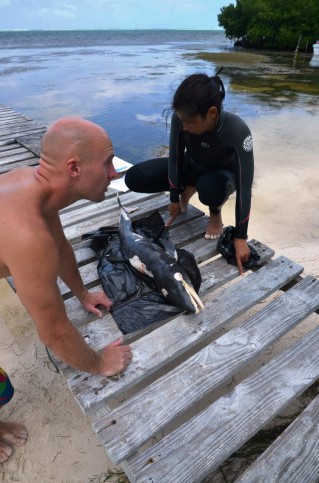In the latest instalment in our series of staff Q&As, we ask Meira Mizrahi, Field Scientist, Belize, some searching questions about science, conservation and superpowers…
What is your scientific background?
I gained a BSc in Ecology & Conservation at James Cook University, Cairns. During my final year I gained a position at the university as a research assistant, working in the Agroforestry and Novel crop unit looking at wood use in forest dependent communities of Papua New Guinea.
I currently work as a field scientist for Blue Ventures in Belize, spreading my time between community work in Sarteneja and coral reef monitoring in Bacalar Chico.
Why do you do what you do?
Following an eye-opening experience as a volunteer in Madagascar, I decided I wanted to work within the world’s oceans, and saw the value in placing efforts into conservation. I never thought I would end up with the same organisation that inspired into this sector.
What is the best/worst thing about being a conservation scientist?
The best thing about my job is knowing that I‘m working towards a cause and not simply to make a living. I feel as though my work leads towards effecting change, and that is something to be proud of.

Getting to grips with a whale carcass – all in a days work!
What do you enjoy most about your job?
I love that everyday is different – you never know what you’re going to see or discover. It’s great to work with likeminded people in a beautiful environment like Belize.
What is your favorite species or group of species and why?
I don’t have a particular favourite species. Having come from a background in ecology, what interests me in interactions between species and systems so it’s hard for me to place favourites! I do love tropical ecosystems and find these biodiversity hotspots fascinating environments to work in.
What would your science superpower be?
After many years watching Captain Planet as a child, I would choose the power of one of the planeteers Gi. Her power was to direct water, so I would create an enormous wave to send all the lionfish from the Caribbean back to their native environment in the Indo-Pacific.
What is one of the strangest things that has happened to you while working on conservation?
Working in conservation, you are constantly placed in strange situations. Since being in Belize, I have dug up a whale carcass, on a separate occasion participated in a pilot whale necropsy, hunted lionfish and spent countless hours upside down underwater collecting benthic data. My most memorable experience was as a volunteer with BV in Madagascar; after completing an early morning ‘night dive’, we surfaced to find the sun rising over the ocean, with a pod of humpback whales basking in its rays. Spectacular

